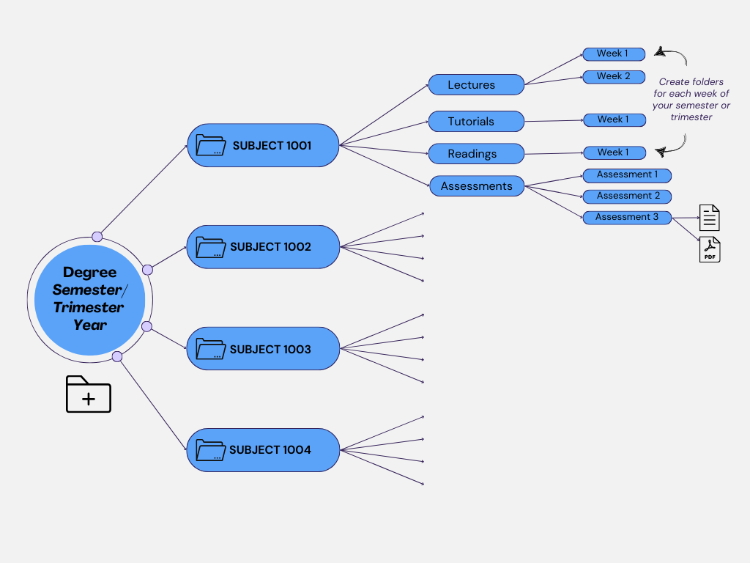What is organisation?
Being organised is the state of ‘being on top of everything’ – when you are organised, you have a sense of being prepared, of knowing what you need to do and how you are going to do it. Of course, this may look and feel different to different people; the important thing is that you know what it ‘looks like’ for you and how to achieve it.
Why is staying organised important?
Staying organised while you study at university will likely be a major contributor to your success as a student. Developing your organisational skills will help you to:
- Reduce stress and give you ‘peace of mind’
- Improve your productivity
- Help you achieve your goals
This resource will provide some key tips relating to four relevant areas of student life:

Organise your tasks
Create effective task lists
- Record your tasks. Use a notebook, diary or planner, either a hard or soft copy, or a combination of both. Find a system that works for you.
- Create separate task lists for different things. For example, for your different subjects, tutorials or assessment tasks. .
- Create sub-tasks required to complete large tasks. For example, sub-tasks for writing an essay might include analysing the assignment question, choosing an essay topic, researching the topic, creating an outline for the essay, and finally, writing the essay.
Prioritise your tasks
- Within your task list, distinguish items that have the highest priority, those that are most important or more complex. When deciding which tasks have priority, consider due dates, time required and weighting of the assessment.
Organise your time
Manage your time
- Time management is the ability to plan out and utilise your time to optimise your productivity. For tips on improving how you manage your time, have a look at the resource on time management.
Mono-task
- Preferably focus on one task at a time. When studying, most of us are tempted to multi-task, rapidly switching from task to task, as it feels as though we are getting more done. However, research shows that multi-tasking tends to decrease our productivity, meaning we actually end up achieving less. Alternately, if you need some multi-tasking to add variety to your workload, do so but be aware of potential traps.
Organise your data
Having dependable systems in place to store and manage your documents is essential.
Organise your physical files
-
Choose a system for organising your paper, handouts, worksheets and notes. You can use separate folders or separate sections of one folder for your different subjects.
-
Scan important physical files to create digital copies. Store these safely on your computer or online for future access.
Organise your digital files
- Practice good computer habits. Store your files in a logical folder system rather than saving everything to the desktop, and name files clearly.
- Backup your data. Use an external hard drive, or a cloud-based storage service, such as OneDrive, to make regular backups.
- Top tips for organising your digital files:
-
- Store your files in a logical folder system.
- Give each file a clear name.
- Do not store files on your desktop or in downloads.
- Make sure your work is backed up (e.g. external hard drive, USB flash drive, or a cloud storage service like Google Drive, DropBox, or OneDrive. OneDrive is free with your UOW account).
-

Organise your learning
Organising your learning is about developing good habits and approaches towards your study, to ensure that you are able to smoothly and successfully complete assignments and exams.
Revise frequently
- Ensure you understand the course content as you go, rather than cramming at the end of semester. If there is something you don't completely understand, make sure you seek help before you reach a crisis-point.
Identify your learning style
- Identify how you tend to learn best and use this to your advantage when studying. Using approaches that work best for you, such as writing out notes, creating mind-maps, using flash cards or reciting out loud, working with peers or alone can assist with the effectiveness of your revisions.
Overcome procrastination
- Identify techniques to help you overcome procrastination, so that you can get more done. Some of the tips mentioned in this resource, such as breaking down large tasks into sub-tasks, and mono-tasking rather than multi-tasking, can help change your study habits to reduce procrastination.
Maintain balance
- Be realistic about how much you can take on at once. Remember that in addition to being a student, you may also need to balance this with part-time or casual work, spending time with friends and family, and having a bit of time to yourself to relax and do the things you enjoy.
- Take steps to manage stress. Being a student is a stressful time for most people. While experiencing some stress is normal and can even be helpful in motivating us to get things done, too much stress is likely to take a toll on your overall health in the long-term. Check out further resources resources on managing stress.